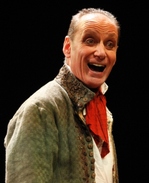SITE GUIDE
SEARCH
REVIEWS
REVIEW ARCHIVES
ADVERTISING AT CURTAINUP
FEATURES
NEWS
Etcetera and
Short Term Listings
LISTINGS
Broadway
Off-Broadway
NYC Restaurants
BOOKS and CDs
OTHER PLACES
Berkshires
London
California
New Jersey
DC
Connecticut
Philadelphia
Elsewhere
QUOTES
TKTS
PLAYWRIGHTS' ALBUMS
LETTERS TO EDITOR
FILM
LINKS
MISCELLANEOUS
Free Updates
Masthead
Writing for Us
A CurtainUp  London Review
London Review
 London Review
London ReviewAs You Like It
| and that great cause of the night is lack of sun — Corin |

Mickey Feast as Touchstone (Photo: Nobby Clark) |
Set on an earthy mound covered in leaves there is no staging difference here between the usurping duke's court and the Forest of Arden. The difference is in the Elizabethan clothes they sport and the girl's courtly bodices look agony to wear so it is probably a relief to change to homespun. I was left asking what exactly is it that prompts the banishment of Rosalind (Georgina Rich) from Duke Frederick (Paul Shelley)'s court or is it just the whim of an autocratic ruler?
The act before the interval would have been rather dull without the illumination of Mickey Feast's brilliantly intelligent and perceptive Touchstone. I very much liked also Adrian Lukis, as Jacques, whom I remember playing Orlando's rival brother Oliver at the RSC almost two decades ago and funny that I cannot remember who played Orlando. But important as these two male roles are, it is on the female role of Rosalind/Ganymede that the success of this play relies. Georgina Rich is very good indeed, a lively animated Rosalind and better as Ganymede with her emotions very close to the surface. Her interaction with Celia as Aliena (Phoebe Fox) is a genuine friendship between two young women and it is interesting to see Celia's reaction to Rosalind falling in love. I liked too the put down by Rosalind of the inappropriately amorous Phoebe, " Sell while you can/ You are not for all markets".
The play opens after the interval with Oliver (William Tapley) who has been tortured in Duke Frederick's court and really comes alive with Rosalind, now disguised as Ganymede, giving flirtatious lessons in the art of wooing for Orlando. The transgender possibilities are fun now, especially when Phoebe decides she will have the pretty youth Ganymede, but remember how much more complex they were in Elizabethan times when Rosalind would have been played by a boy who then disguises "herself" as a boy, only to verbally joust with Orlando as Ganymede pretends to be a girl. Keep up!
Stephen Unwin's production has Corin Buckeridge's original instrumental music between the scenes, music which sounds different and is pretty and evocative. We hear sheep baaing when the shepherds come on to the stage completing the pastoral idyll. I preferred this scene-changing music to the audience being invited to clap along to one of the songs sung by the cast which struck a discordant note of artificiality for me. This production concentrates less on the contrast between the two courts and more on the personalities of the lovers and the agony of being in love, with the comparison of Orlando and Rosalind and Silvius and Phoebe. Then there is the amorous interlude between Touchstone and his country wench Audrey (Claire Prempeh) and the social differences between them which drives much of the comedy.
I would happily have watched this feast of a Touchstone for several more hours and of course when he describes, in a lewd pun, the "country copulatives" he brings the house down. From the moment he enters with his cap adapted with a Mohican like hairstyle decoration, Michael Feast amuses and makes sense of sometimes obscure Shakespearean comedy. Adrian Lukis' lugubrious and personable Jacques is also a star with the most famous speech in the canon, bar those from Hamlet. The show really comes alive in the second half and we leave The Rose feeling uplifted and joyous.
|
Subscribe to our FREE email updates with a note from editor Elyse Sommer about additions to the website -- with main page hot links to the latest features posted at our numerous locations. To subscribe,
E-mail: esommer@curtainup.comesommer@curtainup.com
put SUBSCRIBE CURTAINUP EMAIL UPDATE in the subject line and your full name and email address in the body of the message -- if you can spare a minute, tell us how you came to CurtainUp and from what part of the country. |
| As You Like It
Written by William Shakespeare Directed by Stephen Unwin Starring: Georgina Rich, Michael Feast, Adrian Lukis, David Sturzaker With: Shango Baku, William Tapley, Leon Williams, Okzie Morro, Phoebe Fox, Ravi Aujla, Paul Shelley, Msimisi Dlamini, Rod Arthur, Claire Prempeh, Georgia Maguire, Designed by Jonathan Fensom Lighting: Mike Gunning Sound: John Leonard Music: Corin Buckeridge Fights and movement: Kev McCurdy Running time: Two hours 50 minutes with one interval Box Office: 0871 230 1552 Booking to 26th March 2011 Reviewed by Lizzie Loveridge based on 24th February 2011 performance at The Rose Theatre, 24-26 High Street, Kingston KT1 1HL (Rail: Kingston) |
|
REVIEW FEEDBACK Highlight one of the responses below and click "copy" or"CTRL+C"
Paste the highlighted text into the subject line (CTRL+ V): Feel free to add detailed comments in the body of the email . . . also the names and emails of any friends to whom you'd like us to forward a copy of this review. |




